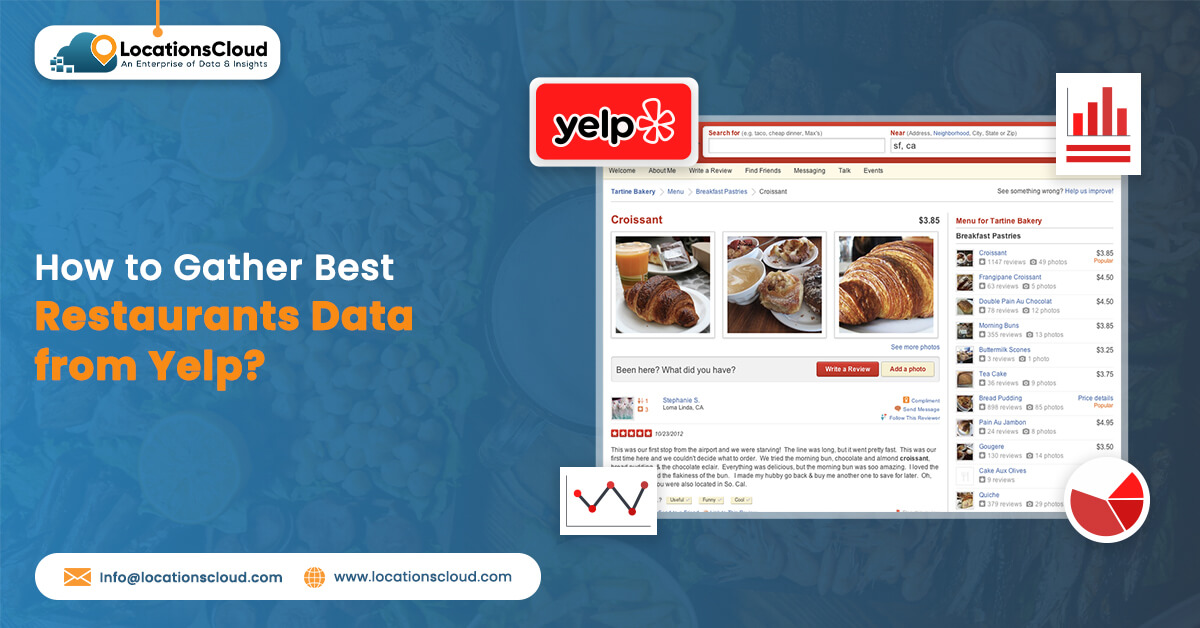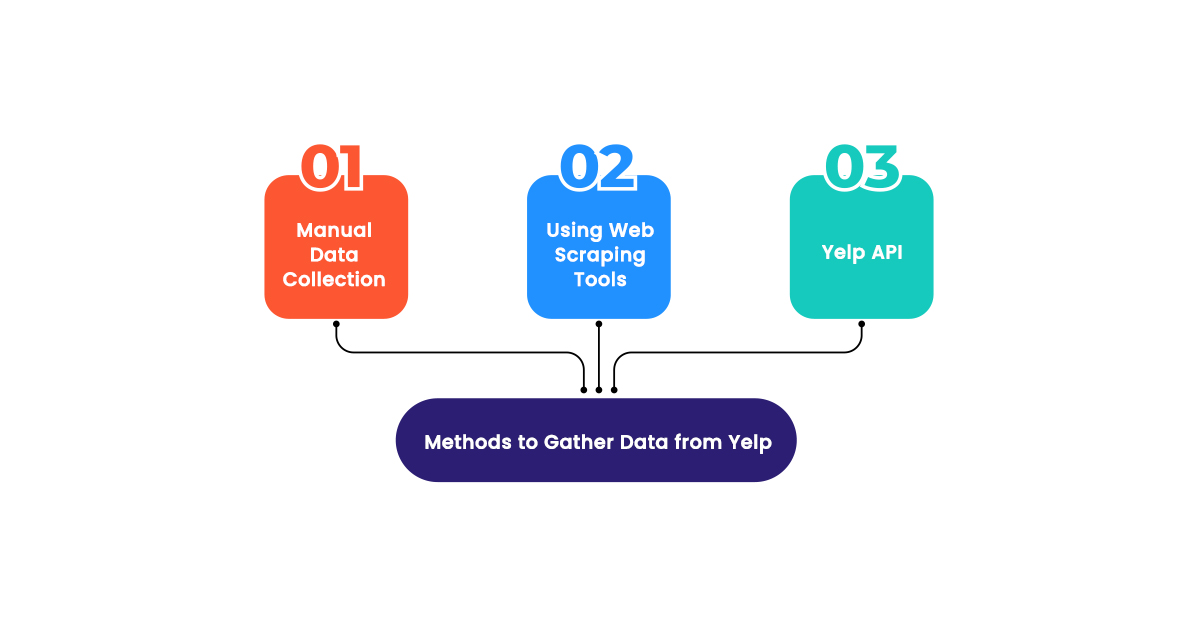
Using information from Yelp can be helpful for businesses, researchers, and people who love food. Yelp, a popular review site, has a lot of information about restaurants, making it useful for anyone who wants to know about good places to eat. This guide will show you how to collect Yelp’s best restaurant data. We will discuss different ways, tools, and best practices to help you get the most out of your data collection efforts.
Understanding Yelp and Its Data
Yelp is a website where people can search and rate local businesses, such as restaurants. On Yelp, you can find helpful information like:
- Names and addresses of restaurants
- Ratings and reviews from customers
- Pictures of food and the inside of the restaurant
- Opening hours
- Menus and prices
- Categories and types of cuisine
This information can be beneficial for different things like:
- Finding good places to eat
- Studying the market
- Understanding what customers think
- Making restaurant guides or apps
Getting this data manual can take time and effort. That’s why people use automated methods like web scraping and APIs.
Why Gather Data from Yelp?
Yelp reviews and ratings provide essential information for both consumers and businesses. Gathering data from Yelp is crucial for several reasons:
- Understanding customers’ thoughts about different restaurants can help businesses improve their services and offerings.
- Analyzing Yelp data allows businesses to see new food trends and what customers like.
- Comparing your restaurant’s performance with others on Yelp can help you identify what you excel at and where you can improve.
- Gathering Yelp data gives valuable information for research that can help businesses make intelligent decisions about growing, advertising, and more.
- Yelp can help you find the best restaurants in any city or neighborhood. The process is helpful for food lovers, tourists, and locals looking for great places to eat.
- If you’re traveling, Yelp can help you find the best places to eat in new cities. It makes sure you eat at places with delicious food and excellent service.
What are the Methods to Gather Data from Yelp?

There are different ways to get information from Yelp. You can pick the best way for you based on your requirements, resources, and what you need.
1. Manual Data Collection
This approach requires manually browsing Yelp and recording the data, but it takes much time and could be more practical for gathering large amounts of data. Here’s how to do it:
- Go to the Yelp website and search for restaurants in your desired location.
- Click on a restaurant to see its details, including ratings, reviews, and contact information.
- Copy and paste the relevant data into a spreadsheet or document.
2. Using Web Scraping Tools
Web scraping is a more efficient way to collect data from Yelp. It involves using software to extract data from websites automatically. Here are some popular tools for web scraping:
- Scrapy is an open-source Python framework designed for web scraping. It’s powerful and customizable, allowing you to scrape Yelp data efficiently.
- Beautiful Soup is a Python library for parsing HTML and XML documents. You can combine it with requests to scrape data from Yelp pages.
- Octoparse is a no-code open-source web scraping tool that lets you scrape Yelp data without needing any programming skills.
Web scraping tools can save time and effort, especially when dealing large datasets.
3. Yelp API
You can use Yelp’s official API to access or analyze Yelp data in your applications. Here’s how you can use Yelp API:
Step 1: Sign up for a Yelp Developer account and create an app to get your API key.
Step 2: Use the Yelp Fusion API to search for businesses, get business details, and access reviews.
Step 3: Extract the required data from the JSON response and store it in a database or a file.
The Yelp API is a reliable and legal way to access Yelp data, but the amount of data you can access might be limited.
What are the Best Practices for Gathering Yelp Data?
When you get information from Yelp, it’s essential to follow some rules to ensure everything goes smoothly and you do everything legally and correctly.
Before getting any information from Yelp, reading and understanding their rules is essential. If you get information from Yelp in a way that goes against their rules, you might get in trouble. The Yelp API is a good and legal way to get Yelp information.
If you get information from Yelp without the Yelp API, proxies and changing your IP address can help avoid getting caught and blocked. That will help you get the information you need without any problems.
Asking for too much information can overload Yelp’s servers and cause problems. To avoid this, make sure to take breaks between your requests. That will help Yelp’s servers and make it look like a person is using the website, not a machine.
Yelp might use CAPTCHAs to prevent machines from getting information. Ensure your tool can handle CAPTCHAs or use another service to solve them. It will ensure you can keep getting the information you need.
Once you have information from Yelp, it’s essential to ensure it’s correct and error-free. Remove copies of the same information, fix any mistakes, and ensure everything is the same. That will improve your research.
Keep the information you get from Yelp in a safe place, like a secure database or cloud storage. Encrypt secret data and follow the rules about protecting information. This will prevent people from getting information they shouldn’t and help keep their privacy safe.
What are the ways to Analyze Yelp Data?
It is crucial to analyze it to gain insights, make informed decisions, and understand Yelp data. Here are some standard analysis techniques:
- Sentiment Analysis: Sentiment analysis determines whether the opinions expressed in reviews are positive, negative, or neutral. By analyzing customer sentiments, businesses can identify areas for improvement and enhance customer satisfaction.
- Trend Analysis: Analyzing Yelp data over time can help identify emerging trends in the restaurant industry. That includes changes in customer preferences, popular cuisines, and dining habits.
- Competitive Benchmarking: By comparing your restaurant’s Yelp data with competitors, you can benchmark your performance and identify areas where you excel or need improvement. It will help you stay competitive and enhance your offerings.
- Customer Segmentation: Segmenting customers based on their reviews and preferences can help businesses tailor their offerings to different customer groups, improving customer satisfaction and loyalty.
- Predictive Analytics: Using machine learning algorithms on Yelp data can help predict future trends and customer behavior. It enables businesses to adapt strategies and proactively stay ahead of the competition.
What are the Challenges in Gathering Yelp Data?
When you collect information from Yelp, you might need some help. Here are a few common ones:
- Banning of IP Address: Yelp may block your IP address if it notices strange behavior. You can address this by using proxies, alternating IP addresses, and reducing the number of requests.
- Legal and Ethical Issues: Collecting Yelp data might lead to legal and ethical problems, especially if you do it without permission. Always adhere to Yelp’s terms of service and consider using their API for authorized access.
- Limits on Data: Yelp’s API restricts the data you can gather within a specific time frame. The process can be frustrating if you need a massive amount of data.
- Data Quality: The correctness of the data you collect can change based on the method used. Gathering data alone may lead to errors, while automated scraping could result in unnecessary or duplicated data.
- Technical Obstacles: If you use web scraping tools or the Yelp API, you will need technical know-how. Writing code, managing APIs, and dealing with big datasets could pose challenges for those with a technical background.
What Are The Ethical and Legal Considerations for Gathering Restaurant Data from Yelp?
When collecting information from Yelp about restaurants, it’s essential to consider doing it fairly and legally. Yelp’s rules say that you’re not allowed to take information without permission, and you could get into trouble if you do.
Being kind and fair to the people who leave reviews on Yelp is also essential. When using the data you’ve collected, you should be careful not to share anyone’s details without asking them first. When discussing information from Yelp, you should be honest and not say anything that could hurt the restaurant.
By following these rules, you not only stay out of trouble but also help to create a pleasant and honest environment for everyone who uses Yelp. When you do things the right way and think about treating people well, you can use Yelp’s information in a good way without causing any problems.
Conclusion: The Value of Gathering Yelp Data
Getting information from Yelp can help businesses, researchers, and food lovers. Whether you gather data by hand, use special tools, or access Yelp’s data in a certain way, it’s essential to do it correctly and overcome any difficulties.
Businesses can use Yelp data to make decisions based on information, understand customers’ thoughts, analyze patterns, measure their performance, and customize what they offer to different customer groups. However, doing this responsibility, following Yelp’s rules, and dealing with legal and moral concerns are essential.
As we advance in the digital era, collecting and analyzing Yelp data will become increasingly crucial for businesses that want to stay competitive and meet their customers’ changing needs. So, if you still need to start, now is the time to start looking into Yelp data and discovering the potential of this valuable information source with LocationsCloud.


